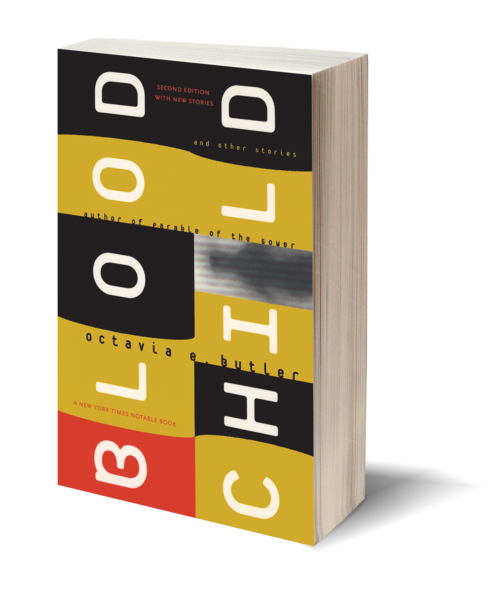“Butler graces new mansions of thought with her eloquent, distinguished, and poignant prose. Although this book is little in size, its ideas and aims are splendidly large.”
– Booklist
“An outstanding short story collection … [Butler] is an impressive writer whose work displays how science fiction readily transcends the perceived stylistic limitations of the genre.”
– St. Petersburg Times
“The title story is justly famous … splendid pieces, set forth in calm, lucid prose with never a word wasted.”
– Kirkus Reviews
“‘Bloodchild’ is one of Octavia Butler’s most haunting, disturbing, and memorable stories, and is also one of the greatest things she ever wrote... It’s an amazingly powerful story that discusses love and birth in the context of social inequality. So long as as the love we feel for others is complicated by societal pressures and imbalances, Butler’s work will remain timelessly haunting, disturbing, and memorable.”
– Clay Andres, Book Riot
“Some of her best writing about this are the autobiographical essays in Bloodchild; she understood very well that what was unique about her story was not the obstacles that had been placed in her way but the combination of talent, hard work, luck, grit, and pure stubbornness that allowed her to break through despite them... She was so giving. There’s a reason everyone who knew her loved her.”
– Gerry Canavan, author of Octavia E. Butler and co-editor of Library of America’s Octavia E. Butler: Kindred, Fledgling, Collected Stories
“The stories collected in BLOODCHILD move quickly, often laying out their premises and conflicts in a single exchange or sequence… She doesn’t waste a word.”
– Stephen Kearse, The New York Times, "The Essential Octavia Butler"
“Ms. Butler, who neither hides nor trumpets the fact that she is one of a handful of black American women writing science fiction, excels in the calm, straightforward presentation of characters and societies in extremis... Where another writer might have wrung drama from the original interspecies confrontation and accommodation, Ms. Butler picks up the thread generations later, in a scene that veers from edgy domesticity into unmentionable horror and ends in what can only be described as triumphal love. It is a fine example of how science fiction, by subverting expectations, can jar us into a new appreciation of familiar truths.”
– Gerald Jonas, The New York Times
“...the future is made of others’ bodies, if only because we cannot sustain life or reproduce it on our own. Butler expresses this viscerally in her exquisite short story ‘Bloodchild’... Freedom is always a negotiation with others—even for the powerful—and to forget this, Butler suggests, is ultimately to denigrate the oppressed.”
– Julian Lucas, The New Yorker
“Bloodchild is a compelling and horrifying novella . . . [by an] exceptionally talented writer.”
– Publishers Weekly
“‘Bloodchild’ is a glorious accomplishment—an elegant, urgent tale that changes all who read it. Perhaps that’s because it’s also a lasting and faithful depiction of what we can and will do to survive.”
– Nisi Shawl, Nebula-award nominated author of Everfair, co-editor of Library of America’s Octavia E. Butler: Kindred, Fledgling, Collected Stories, TOR
“Those reading this remarkable writer for the first time will find Bloodchild a useful signpost to Parable of the Sower and her other novels.”
– Elizabeth Hand, The Washington Post








